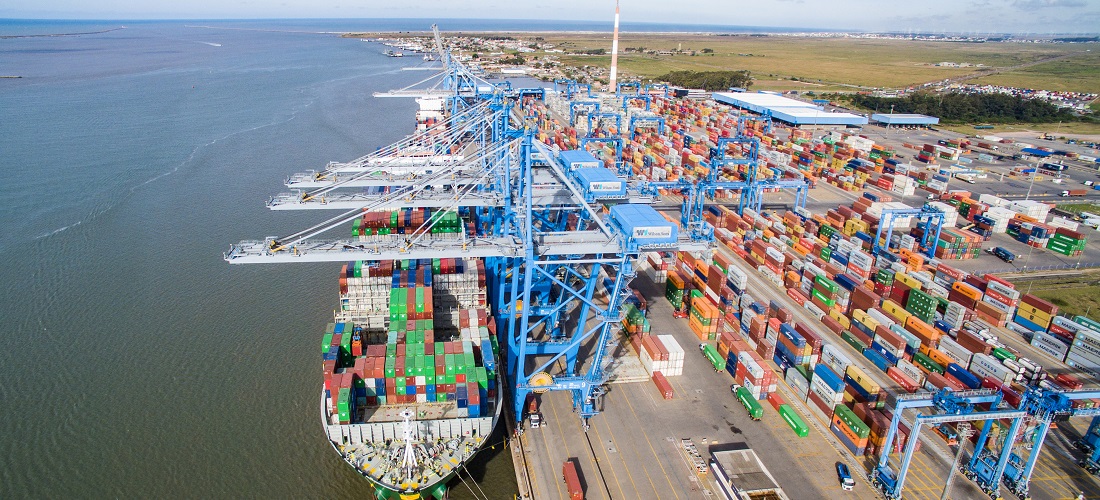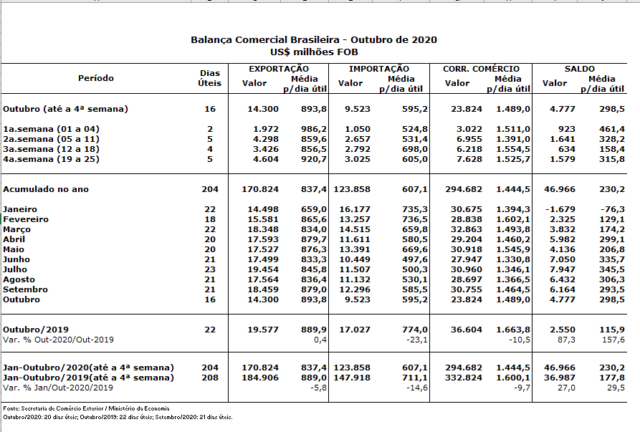
Brazilian trade balance registers US$ 1.58 billion surplus in 4th week of October
Oct, 26, 2020 Posted by Ruth HollardWeek 202044
The Brazilian trade balance registered a surplus of US$ 1.58 billion in the fourth week of October. Data released this Monday, October 26, by SECEX, the Foreign Trade Secretariat of the Ministry of Economy, indicates that the Brazilian trade balance registered a surplus of US$ 1.58 billion and a trade flow of US$ 7.63 billion in the fourth week of October 2020 – with five working days – as a result of exports worth US$ 4.60 billion and imports of US$ 3.03 billion. For the full year, exports totaled US$ 170.82 billion and imports totaled US$ 123.86 billion, with a positive balance of US$ 46.97 billion and a trade flow of US$ 294.68 billion.
Monthly Analysis
In exports, comparing the daily average up to the fourth week of October 2020 (US$ 893.76 million) with that of October 2019 (US$ 889.86 million), there was an increase of 0.4%, due to the increase in sales of products from the Manufacturing Industry (+ 2.7%) and the Extractive Industry (+ 11.9%). These were mostly offset by a decrease in Agricultural sales (- 20.1%).
The growth in exports was driven mainly by the increase in sales of the following products from the Manufacturing Industry: Sugars and molasses (+ 133.3%); Aircraft and other equipment, including parts (+ 51.4%); Gold, non-monetary, excluding gold ores and concentrates (+ 31.3%); Alcohols, phenols, phenols-alcohols, and their halogenated, sulfonated, nitrated or nitrosated derivatives (+ 83.0%) and Cellulose (+ 15.3%). In the Extractive Industry, the growth in exports is mainly due to the increase in sales of the following products: Iron ore and its concentrates (+ 45.3%); Copper ores and concentrates (+ 41.1%); and Crude fertilizers, except organic fertilizers (+ 41.8%).
For imports, the daily average until the fourth week of October 2020 (US$ 595.22 million) was – 23.1% below the October average of last year (US$ 773.97 million). In this comparison, expenses fell, mainly, with Agriculture (- 2.0%), with Extractive Industry (- 42.8%) and with Manufacturing Industry products (- 22.8%).
The fall in imports was mainly driven by the decrease in spending on the following products from the Manufacturing Industry: Iron or steelworks and other articles of common metals (- 74.2%); petroleum or bituminous mineral fuel oils, except crude oils (- 50.7%); taps, valves and similar devices for plumbing, boilers, reservoirs, vats and other containers (- 46.7%); automotive vehicle parts and accessories (- 39.5%) and chemical fertilizers, except crude fertilizers (- 17.2%).
In relation to the Extractive Industry, the fall in imports was mainly driven by the decrease in spending on the following products: copper ores and concentrates (-75.7%); coal, even in powder, but not agglomerated (-34.7%); crude petroleum or crude bituminous mineral oils (-31.4%); natural gas, liquefied or not (-29.7%), and other ores and concentrates of base metals (-74.7%). Finally, in relation to agricultural products, the fall in imports is mainly due to unground wheat and rye (-12.2%); latex, natural rubber, balata, gutta-percha, guaiúle, chicle, and natural gums (- 36.9%); whole fish whether alive, dead, or chilled (- 24.2%); vegetables, fresh or chilled (- 9.5%) and raw vegetable materials (- 20.1%).
-
Blog News (ENG)
Feb, 11, 2025
0
Dollar Revenue from Agribusiness Exports Declines in 2024
-
Grains
May, 20, 2022
0
China’s soybean imports surged in April with the arrival of delayed shipments
-
Other Cargo
Aug, 19, 2022
0
Brazil heavy machinery sales to LATAM climb to US$ 747.5 million
-
Grãos
Oct, 28, 2022
0
EU cuts maize crop forecast, raises import outlook


